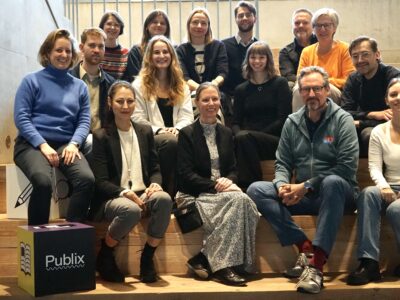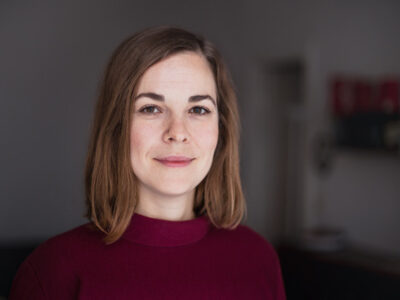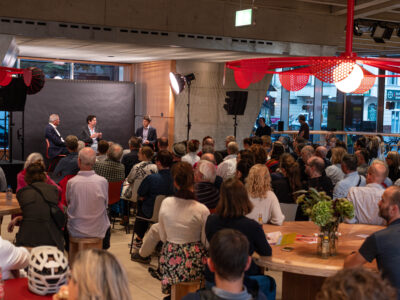Interview: “A quarter of Germans have migration backgrounds – and that is something viewers should see in our show”
In German slang, the word “checker” means someone who gets it, someone who’s in the know. And Checker Tobi, who hosts a show of the same name on the public broadcaster Bayrischer Rundfunk, is all that. For more than 10 years now, his shows have been delighting elementary school children from many different social backgrounds. How does he teach his audience about democracy?

Tobi, you just turned 40, but you’re a star for eight-year-olds. Why?
There are probably a number of factors. First, I’ve been doing it for quite a long time. There is a huge number of shows in the video library. You can really dive into an entire universe. Second, I’m Checker Tobi – it’s the name of the show, the name of the song, it’s a complete identity. Third, it maybe has to do with the way I ask questions and don’t take myself too seriously. In doing so, I think I make an all-important connection with my audience.
Does the show help educate primary schoolchildren about the importance of democracy?
Absolutely! We aspire to convey to the youngest members of our society that their voices are being heard and that they might even make a difference. Experiencing empowerment at an early age inspires children, and they can then carry on with it. We don’t just want to show what is important to know about each topic we cover – we also take a look at the social context. We might go behind the scenes of a great hotel, for example, but also talk about the effects tourism has on our climate. And we do the same thing with topics like social equality and justice.
What role do you then try to play?
For the children, I may first be something of a role model. Someone who has confidence, goes there and shows curiosity. Later on, for teenagers, it becomes more important whether they see themselves represented on screen. I am a white man who grew up in Germany. I haven’t ever experienced discrimination in my life. I loved the children’s show host Peter Lustig, but he kind of looked like me. Today, a quarter of Germans have migration backgrounds. That is something viewers should see in our show – in the children and adults who appear on it.
In addition to yourself, Can, Marina and Julian also guide viewers through the “Checker universe”. How do you as a team approach the issue of diversity?
It should be possible to adopt different perspectives in all editorial offices. On average, our team is female, white, western German and has no direct migration experience. And that’s a problem for some topics, of course. We look for protagonists who have a different viewpoint, and we also bring in help from outside. In instances where we don’t make much headway with our journalistic, adult perspective, we might hold a survey in a school class. Interviews for research purposes don’t always have to be conducted with experts. They can also involve people from a certain demographic group in order to gain a perspective that you don’t have yourself. That is true for editorial offices and teams in all of Germany, in many different industries.
Your editorial work, in other words, also reflects the democratic context that you wish to convey.
Yes. The diversity that has long since begun to characterise our society must be depicted everywhere. And that should also be made possible by the decision-makers, who are predominantly white males.
How do you know that your stories and your educational mission are actually reaching your audience?
It is always difficult to know whether television really works. I only get feedback when I meet with our audience. But when I see how excitedly children from all kinds of different backgrounds speak about our shows, I can see that they take something into their lives, their classes at school and their families. Every home is different, but all children are reached at school, and I believe you have to lay the foundations there. Since the pandemic, if not before, I have had the sense that an increasing number of teachers are working with our material in class. We are being used in schools from Neukölln in Berlin to the Munich district of Schwabing, in rural areas and in the city. These days, it is mostly teenagers who come up to me and say: “Hey, you were my childhood. It was cool.” It is great to hear something like that from a 13-year-old, full of appreciation and love. They take us with them as they become teenagers and adults.
As head of CineKindl, a program for young viewers at the Filmfest München, you have a good idea of the society being shown to the youngest generation. What has changed?
You can see that filmmakers have developed a stronger awareness for the fact that diversity has to at least play a role in front of the camera and in the narrative. In the French youth social dramas just as much as in the Swedish children’s horror movie. There are more and more strong roles for girls and non-white children in the focus of films. The issue of climate is present more often. And – perhaps this has something to do with Fridays For Future – it is more often about children becoming active on their own initiative and starting movements.
Turning 40, have you ever thought of making television for adults?
Tobias Krell: The Checker universe continues to grow. But personally, I would also like to reach older viewers this year. (Public broadcaster) SWR, for example, is currently talking to us about a film about the division in society and the hatred that we are all increasingly feeling.
When have you been confronted by hate?
Tobias Krell: When it comes to the environmental group the Last Generation, I started wondering: How can it be that normal people get out of their cars and pull demonstrators off the street by their hair? Things seem to escalate so quickly. It seems to me that the situation has grown more extreme in the last three to five years. That is something we want to take look at in the film: Is that really the case? And if so, why? We are currently in the research and preparation phase and hope to start filming this year.
Does the widely lamented division of society really exist?
Tobias Krell: The sociologist Steffen Mau just wrote a book on the issue with two co-authors called “Triggerpunkte” (Trigger Points). The book says that there is actually no real division, but that many people feel there is. We want to approach the topic in reports and experiments and try to really understand „hate“. Also interesting: What role does media play when it comes to the formation of groups, how loud the fringes become and how we experience it all?
That sounds challenging – and like something that could have an open outcome.
Tobias Krell: Yes, it’s not necessarily for children, but I hope that teenagers with an interest in politics will be able to get something out of it. And especially people who have similar questions or maybe already have an opinion about it. Our idea is to find answers during filming.
Around 170 "Checker Tobi" episodes on various topics are available in the ARD media library, on YouTube’s "CheckerWelt" and on Bayrischer Rundfunk.
Here you can download "Checker" teaching material for teachers.
Photo:
Portrait Tobias Krell (c) Jennifer Fey


